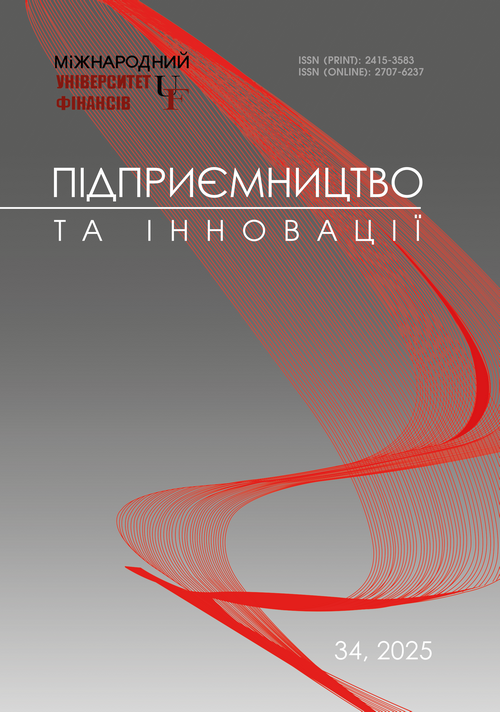METHODS OF VALUATION OF INTELLECTUAL CAPITAL
Abstract
The article examines modern approaches to the analysis and evaluation of intellectual capital as a key resource in the knowledge economy. The authors emphasize that intellectual capital is a strategic asset that ensures long-term competitiveness of enterprises and organizations. The article identifies that intellectual capital consists of human, structural and customer capital, each of which plays an important role in creating added value and shaping innovation potential. The paper systematizes existing methods for assessing intellectual capital, focusing on their strengths and weaknesses, as well as on the possibilities of practical application. Quantitative and qualitative approaches, including market, accounting and ratio methods, are considered. In addition, the methodologies based on the assessment of the effectiveness of knowledge management are highlighted. Particular attention is paid to integrated models that allow taking into account the interrelationships between different components of intellectual capital. The article discusses the latest trends in the field of intellectual capital valuation, in particular, the use of digital technologies, such as artificial intelligence, Big Data and analytical platforms, which increase the accuracy and speed of valuations. It is noted that the introduction of such tools contributes to a more comprehensive understanding of the role of intellectual capital in creating competitive advantages. The practical significance of the study lies in the formulation of recommendations for enterprises to choose the most appropriate valuation methods. The proposed approaches allow to integrate the results of the assessment into strategic planning, increase the transparency of resource management and ensure the sustainable development of the organization. Attention is also paid to the importance of developing individual valuation models that take into account the specifics of the industry, business size and its organizational features. Thus, the article makes a significant contribution to the development of research in the field of intellectual capital. It offers both theoretical foundations for understanding this phenomenon and practical tools for their implementation, which are useful for scientists, managers and practitioners working in the field of innovation development.
References
Dashevska A. A., Skorobagata L. V. (2017) Human Capital in the Accounting and Taxation System. Problems of Entrepreneurship Development in Ukraine in the Context of Revitalization of European Integration Processes. pp. 94–98.
Melnyk L. G., Ilyashenko S. N., Kasyanenko V. A. (2004) Economics of information and information systems of the enterprise: training. way. Sumy: IED “University Book”, 400 p.
Structure of the intellectual capital of the enterprise. Available at: https://idruchniki.com/78162/pravo/struktura_intelektualnogo_kapitalu_pidpriyemstva
Intellectual capital: the essence and methods of evaluation. Available at: http://www.economy.nayka.com.ua/?op=1&z=3288
Assessment of the intellectual capital of the enterprise. Available at: https://idruchniki.com/78165/pravo/otsinka_intelektualnogo_kapitalu_pidpriyemstva
Intellectual capital. Available at: https://www.pharmencyclopedia.com.ua/article/6982/intelektualnij-kapital
Methods of estimating the intellectual capital of a tourist enterprise. Available at: http://tourlib.net/statti_ukr/rotan.htm
Features of the knowledge economy. Available at: https://studopedia.su/17_4989_ osoblivosti-ekonomiki-znan.html
Innovative activity of the enterprise. Available at: https://www.libr.dp.ua/sitelibr/?idm=1&idp=11&ida=1081
Дашевська А.А., Скоробагата Л.В. Людський капітал у системі обліку та оподаткування. Проблеми розвитку підприємництва в Україні в контексті активізації процесів євроінтеграції. 2017. С. 94–98.
Мельник Л.Г., Ілляшенко С.М., Касьяненко В.А. Економіка інформації та інформаційні системи підприємства: навч. посіб. Суми : Університетська книга, 2004. 400 с.
Структура інтелектуального капіталу підприємства. URL: https://pidruchniki.com/78162/pravo/struktura_intelektualnogo_kapitalu_pidpriyemstva
Інтелектуальний капітал: сутність та методи оцінки. URL: http://www.economy.nayka.com.ua/?op=1&z=3288
Оцінка інтелектуального капіталу підприємства. URL: https://pidruchniki.com/78165/pravo/otsinka_intelektualnogo_kapitalu_pidpriyemstv
Інтелектуальний капітал. URL: https://www.pharmencyclopedia.com.ua/article/6982/intelektualnij-kapital
Методи оцінки інтелектуального капіталу туристичного підприємства. URL: http://tourlib.net/statti_ukr/rotan.htm
Особливості економіки знань. URL: https://studopedia.su/17_4989_osoblivosti-ekonomiki-znan.html
Інноваційна активність підприємства. URL: https://www.libr.dp.ua/site-libr/?idm=1&idp=11&ida=1081



